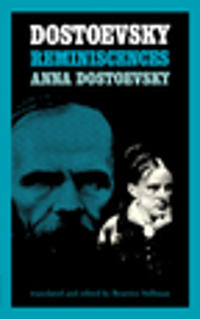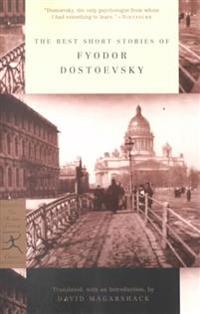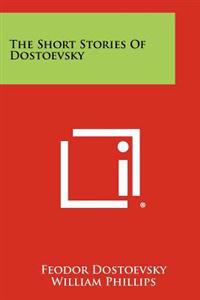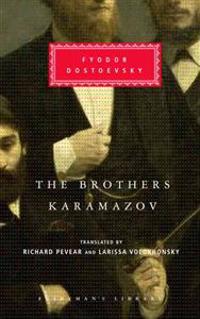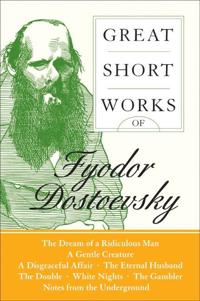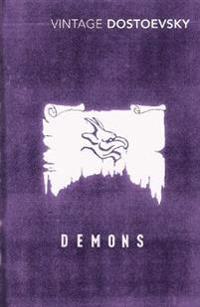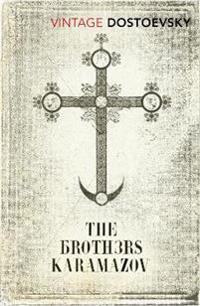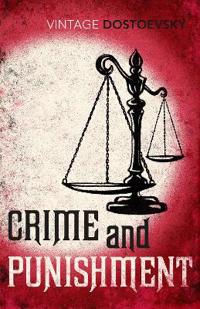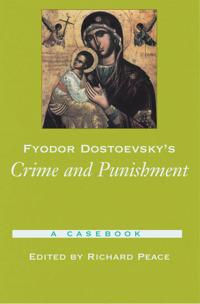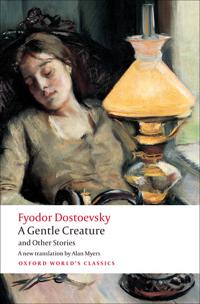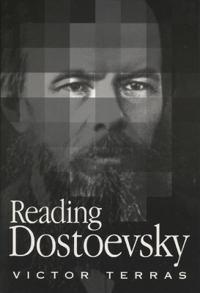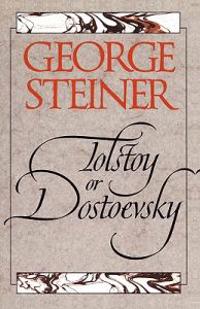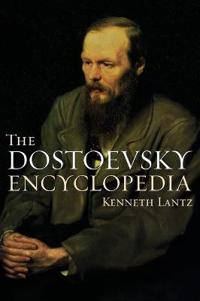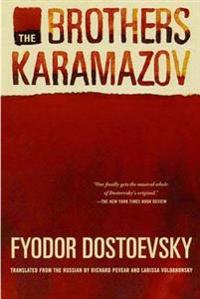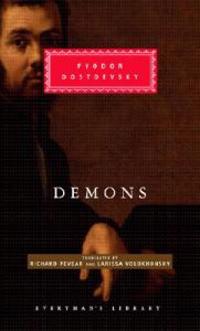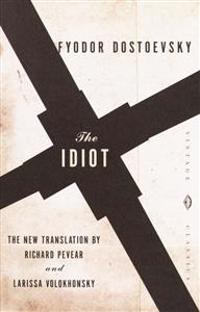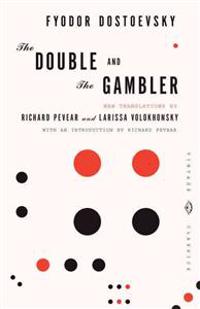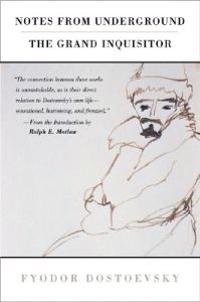Dostoevsky Dostoevsky - Reminiscences (Paper) (Häftad)
avA DOSTOEVSKY
ISBN: 9780871401175 - UTGIVEN: 1977-04The story of Dostoevsky s extraordinary second marriage during which he wrote his greatest novels is a novel in itself . . . It is a plain, straightforward, honest, and moving account of a happy if reckless marriage . . . The brave, simple young adorer has written the only really intimate portrait o[...]
The Best Short Stories of Dostoevsky (Storpocket)
avF. M. Dostoevsky
ISBN: 9780375756887 - UTGIVEN: 2001-03This collection, unique to the Modern Library, gathers seven of Dostoevsky's key works and shows him to be equally adept at the short story as with the novel. Exploring many of the same themes as in his longer works, these small masterpieces move from the tender and romantic White Nights, an archety[...]
The Short Stories of Dostoevsky (Häftad)
avFyodor Mikhailovich Dostoevsky, William Phillips
ISBN: 9781258386412 - UTGIVEN: 2012-06The Brothers Karamazov (Inbunden)
avFyodor M. Dostoevsky, Fyodor Dostoyevsky, Dostoevsky
ISBN: 9780679410034 - UTGIVEN: 199204The violent lives of three sons are exposed when their father is murdered and each one attempts to come to terms with his guilt[...]
Great Short Works of Fyodor Dostoevsky (Häftad)
avFyodor Dostoyevsky
ISBN: 9780060726461 - UTGIVEN: 2004-07The shorter works of one of the world's greatest writers, including The Gambler and Notes from UndergroundThe short works of Dostoevsky exist in the very large shadow of his astonishing longer novels, but they too are among literature's most revered works. The Gambler chronicles Dostoevsky's own add[...]
Demons (Storpocket)
avF. M. Dostoevsky
ISBN: 9780099140016 - UTGIVEN: 199801This title comes from the award-winning translators of "Crime and Punishment", Richard Pevear and Larissa Volokhonsky. Based on a real-life crime which horrified Russia in 1869, Dostoevsky intended his novel to castigate the fanaticism of his country's new revolutionaries, particularly those known a[...]
The Brothers Karamazov (Storpocket)
avF. M. Dostoevsky
ISBN: 9780099922803 - UTGIVEN: 199201"The Brothers Karamazov" is a murder mystery, a courtroom drama, and an exploration of erotic rivalry in a series of triangular love affairs involving Karamazov and his three sons - the impulsive and sensual Dmitri; the coldly rational Ivan; and the healthy young novice Alyosha. Through the gripping[...]
Crime and Punishment (Storpocket)
avF. M. Dostoevsky
ISBN: 9780099981909 - UTGIVEN: 199801A prize-winning new translation which brings a combined knowledge of Russian and English to Dostoevsky's compelling text. Raskolnikov is an impoverished student who commits murder. His subsequent devouring guilt throws him into insanity and delirium that become increasingly unbearable.[...]
Notes from Underground; The Double (Häftad)
avFyodor M. Dostoevsky, Fyodor Dostoyevsky
ISBN: 9780140442526 - UTGIVEN: 197207'It is best to do nothing The best thing is conscious inertia So long live the underground ' Alienated from society and paralysed by a sense of his own insignificance, the anonymous narrator of Dostoyevsky's groundbreaking "Notes from Underground" tells the story of his tortured life. With bitter [...]
Crime and Punishment (Häftad)
avFyodor Dostoevsky
ISBN: 9780141192802 - UTGIVEN: 2014-02"Will I really - I mean, really - actually take an axe, start bashing her on the head, smash her skull to pieces?...Will I really slip in sticky, warm blood, force the lock, steal, tremble, hide, all soaked in blood ...axe in hand?...Lord, will I really?' This new translation of Dostoevsky's 'psycho[...]
Fyodor Dostoevsky's Crime And Punishment
ISBN: 9780195175622 - UTGIVEN: 2005-11This Casebook is a collection of interpretations of Crime and Punishment. The selection not only reflects earlier work by major critics in the field, but also more recent studies. At the same time the choice of critical approaches has been made on the basis of covering the novel's various aspects: D[...]
Fyodor Dostoevsky's Crime And Punishment (Pocket)
avRichard (EDT) Peace
ISBN: 9780195175639 - UTGIVEN: 2005-11This Casebook is a collection of interpretations of Crime and Punishment. The selection not only reflects earlier work by major critics in the field, but also more recent studies. At the same time the choice of critical approaches has been made on the basis of covering the novel's various aspects: D[...]
White Nights (Häftad)
avF. M. Dostoevsky
ISBN: 9780199555086 - UTGIVEN: 200904In the stories in this volume Dostoevsky explores both the figure of the dreamer divorced from reality and also his own ambiguous attitude to utopianism, themes central to many of his great novels. In White Nights the apparent idyll of the dreamer's romantic fantasies disguises profound loneliness a[...]
Reading Dostoevsky (Häftad)
avVictor Terras
ISBN: 9780299160548 - UTGIVEN: 199901"I know of no other book that approaches the art of Dostoevsky in the manner Terras does. And few if any that bring the artistic world of Dostoevsky in such a fine focus."-Robert Louis Jackson, Yale University "A substantial contribution both to Dostoevsky scholarship and to scholarship on the novel[...]
Tolstoy or Dostoevsky: An Essay in the Old Criticism, Second Edition (häftad)
ISBN: 9780300069174 - UTGIVEN: 1996-10The Meek One: A Fantastic Story: An Annotated Russian Reader (Pocket)
avDostoyevsky, Fyodor, Dostoevsky, Fyodor Mikhailovich
ISBN: 9780300162325 - UTGIVEN: 2011-09-02This fully annotated paperback learner's edition of Dostoevsky's short story "The Meek One" is intended for intermediate and advanced Russian students. In addition to the Russian text, the book includes an introduction discussing the story's historical context, literary significance, and critical re[...]
The Dostoevsky Encyclopedia
ISBN: 9780313303845 - UTGIVEN: 2004-06One of the greatest writers of all time, Fyodor Dostoevsky (1821-1881) is best known for such masterpieces as Crime and Punishment and The Brothers Karamazov. His works are widely read and studied today, and he has received much biographical and critical attention. Like many other writers of endurin[...]
The Brothers Karamazov (Häftad)
avFyodor M. Dostoevsky, Fyodor Dostoyevsky
ISBN: 9780374528379 - UTGIVEN: 200206The award-winning translation of Dostoevsky's last and greatest novel.Richard Pevear and Larissa Volokhonsky were awarded the PEN/ Book-of-the-Month Translation Prize for The Brothers Karamazov and have also translated Dostoevsky's Crime and Punishment, Notes from Underground, Demons, and The Idiot.[...]
Demons (Inbunden)
avFyodor M. Dostoevsky, Fyodor Dostoyevsky, Joseph Frank
ISBN: 9780375411229 - UTGIVEN: 200010Set in mid 19th-century Russia, "Demons "examines the effect of a charismatic but unscrupulous self-styled revolutionary leader on a group of credulous followers.Inspired by the true story of a political murder that horrified Russians in 1869, Fyodor Dostoevsky conceived of "Demons" as a "novel-pamp[...]
The Idiot [With Ribbon Book Mark] (Inbunden)
avFyodor M. Dostoevsky, Fyodor Dostoyevsky
ISBN: 9780375413926 - UTGIVEN: 200204In "The Idiot," the saintly Prince Myshkin returns to Russia from a Swiss sanatorium and finds himself a stranger in a society obsessed with wealth, power, and sexual conquest. He soon becomes entangled in a love triangle with a notorious kept woman, Nastasya, and a beautiful young girl, Aglaya. Ext[...]
The Idiot (Häftad)
avFyodor M. Dostoevsky
ISBN: 9780375702242 - UTGIVEN: 200307Prince Myshkin, a good yet simple man, is out of place in the corrupt world obsessed by wealth, power, and sexual conquest created by Russia's elite ruling class, as he becomes caught in the middle of a violent love triangle with two women who become rivals for his attention. Reprint. 12,500 first p[...]
Crime and Punishment (Pocket)
avDostoevsky, F M
ISBN: 9780393956238 - UTGIVEN: 1989-05-24New footnotes have been added, based on discoveries by the leading Soviet Dostoevsky scholar, Sergei Belov. "Backgrounds and Sources," highly praised in the Second Edition, remains unaltered. Included are a detailed map of nineteenth-century St. Petersburg, selections from Dostoevsky's notebooks and[...]
Notes from Underground and the Grand Inquisitor (Häftad)
avFyodor Mikhailovich Dostoevsky
ISBN: 9780452285583 - UTGIVEN: 2003-11"The connection between these works is unmistakable, as is their direct relation to Dostoevsky's life--sensational, harrowing, and frenzied."
--From the Introduction by Ralph E. Matlow
[...]The Double (Häftad)
avF. M. Dostoevsky
ISBN: 9780486295725 - UTGIVEN: 199707Most significant of the Russian novelist's early stories (1846) offers a straight-faced treatment of a hallucinatory theme. Golyadkin senior is a powerless target of persecution by Golyadkin junior, his double in almost every respect. Familiar Dostoyevskan themes of helplessness, victimization, scan[...]

